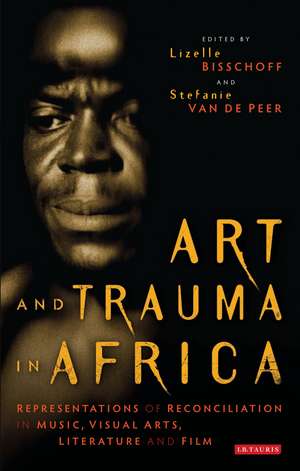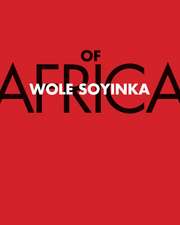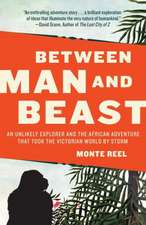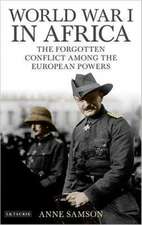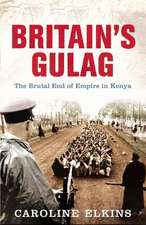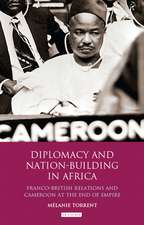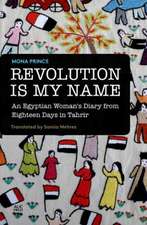Art and Trauma in Africa: Representations of Reconciliation in Music, Visual Arts, Literature and Film
Editat de Lizelle Bisschoff, Stefanie Van de Peeren Limba Engleză Hardback – 26 feb 2013
| Toate formatele și edițiile | Preț | Express |
|---|---|---|
| Paperback (1) | 220.29 lei 6-8 săpt. | |
| Bloomsbury Publishing – 29 sep 2017 | 220.29 lei 6-8 săpt. | |
| Hardback (1) | 774.62 lei 6-8 săpt. | |
| Bloomsbury Publishing – 26 feb 2013 | 774.62 lei 6-8 săpt. |
Preț: 774.62 lei
Preț vechi: 1113.41 lei
-30% Nou
Puncte Express: 1162
Preț estimativ în valută:
148.23€ • 161.66$ • 124.98£
148.23€ • 161.66$ • 124.98£
Carte tipărită la comandă
Livrare economică 24 aprilie-08 mai
Preluare comenzi: 021 569.72.76
Specificații
ISBN-13: 9781848856929
ISBN-10: 184885692X
Pagini: 360
Ilustrații: 22 bw integrated
Dimensiuni: 138 x 216 x 38 mm
Greutate: 0.57 kg
Editura: Bloomsbury Publishing
Colecția I.B.Tauris
Locul publicării:London, United Kingdom
ISBN-10: 184885692X
Pagini: 360
Ilustrații: 22 bw integrated
Dimensiuni: 138 x 216 x 38 mm
Greutate: 0.57 kg
Editura: Bloomsbury Publishing
Colecția I.B.Tauris
Locul publicării:London, United Kingdom
Notă biografică
Lizelle Bisschoff is a Lord Kelvin Adam Smith Research Fellow in Film and Television Studies at the University of Glasgow, conducting a three-year research project into digital African arts. She is the Founder and previous Director of the Africa in Motion (AiM) Film Festival in Scotland, now in its eighth year. She holds a PhD in African Cinema from the University of Stirling, in Scotland, for which she researched the role of women in Southern and West African cinema. She has previously conducted a two-year postdoctoral research project into the emerging East African film industries, while based in the Centre of African Studies at the University of Edinburgh. Lizelle has published several articles on sub-Saharan African cinema and regularly attends film festivals in Africa as jury member and speaker. Stefanie Van de Peer is a Research Co-ordinator at the University of St Andrews, Scotland. She received her PhD from the University of Stirling in Scotland. Her research focuses on women's filmmaking in the Middle East and North Africa. Until 2011 she was Co-Director of the Africa in Motion (AiM) Film Festival. She was Research Fellow at the Five Colleges Women's Studies Research Center in Massachusetts, where she also worked on women in cinema. She has published on Tunisian, Egyptian, Moroccan, Syrian and Lebanese women's films and programmed films for the Middle Eastern Film Festival in Edinburgh, the REEL Festival in Damascus and Beirut and the Boston Palestine Film Festival.
Cuprins
ContentsForewordIntroduction Representing the UnrepresentablePart One: Music Chapter One: Hip Hop Lyrics as Tool for Conflict Resolution in the Niger DeltaChapter Two: Grooving on Broken: Dancing War Trauma in Angolan KuduroChapter Three: Local Arts versus Global Terrorism: The Manifestations of Trauma and Modes of Reconciliation in Moroccan Music FestivalsPart Two: Visual ArtsChapter Four: Transforming Arms into Ploughshares: Weapons that Destroy and Heal in Mozambican Urban ArtChapter Five: Unlocking the Doors of Number Four Prison: Curating the Violent Past in Contemporary South AfricaChapter Six: Imaging Life after Death: Photography and the 1994 Genocide in RwandaPart Three: LiteratureChapter Seven: 'It was a terrible time to be alive': Narrative Reconciliation in Contemporary West African FictionChapter Eight: Truth Will Set You Free: Implications of a Creative Narrative for the 'Official' Discourse of the South African Truth and Reconciliation CommissionChapter Nine: Re-fathoming the Dark of Heartness: Contrapuntal Representations of the Rwandan Genocide Part Four: Film Chapter Ten: Reconciling the African Nation: Fanta Regina Nacro's La Nuit de la Vérité Chapter Eleven: Closed Windows onto Morocco's Past: Leila Kilani's Our Forbidden Places Chapter Twelve: Beyond 'Victimology': Generating Agency through Film in Eastern Democratic Republic of the CongoChapter Thirteen: Truth, Reconciliation and Cinema: Reflections on South Africa's Recent Past in Ubuntu's Wounds and Homecoming
